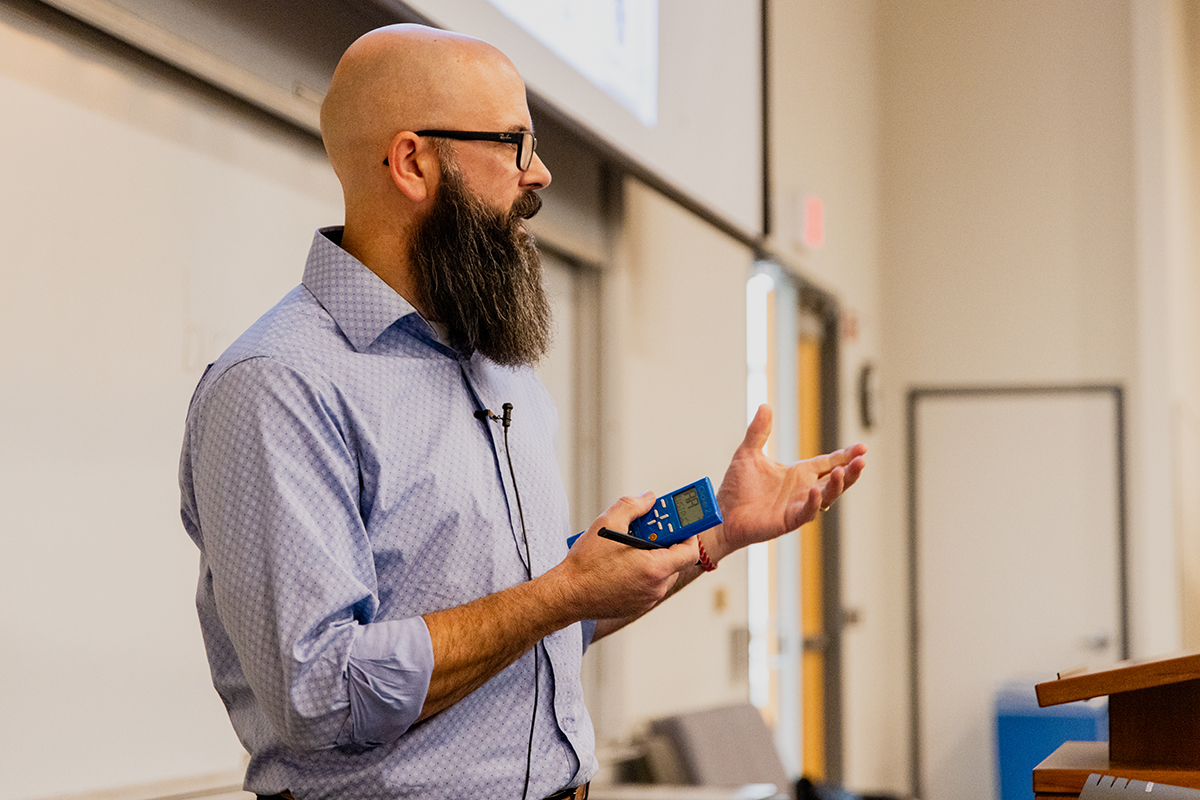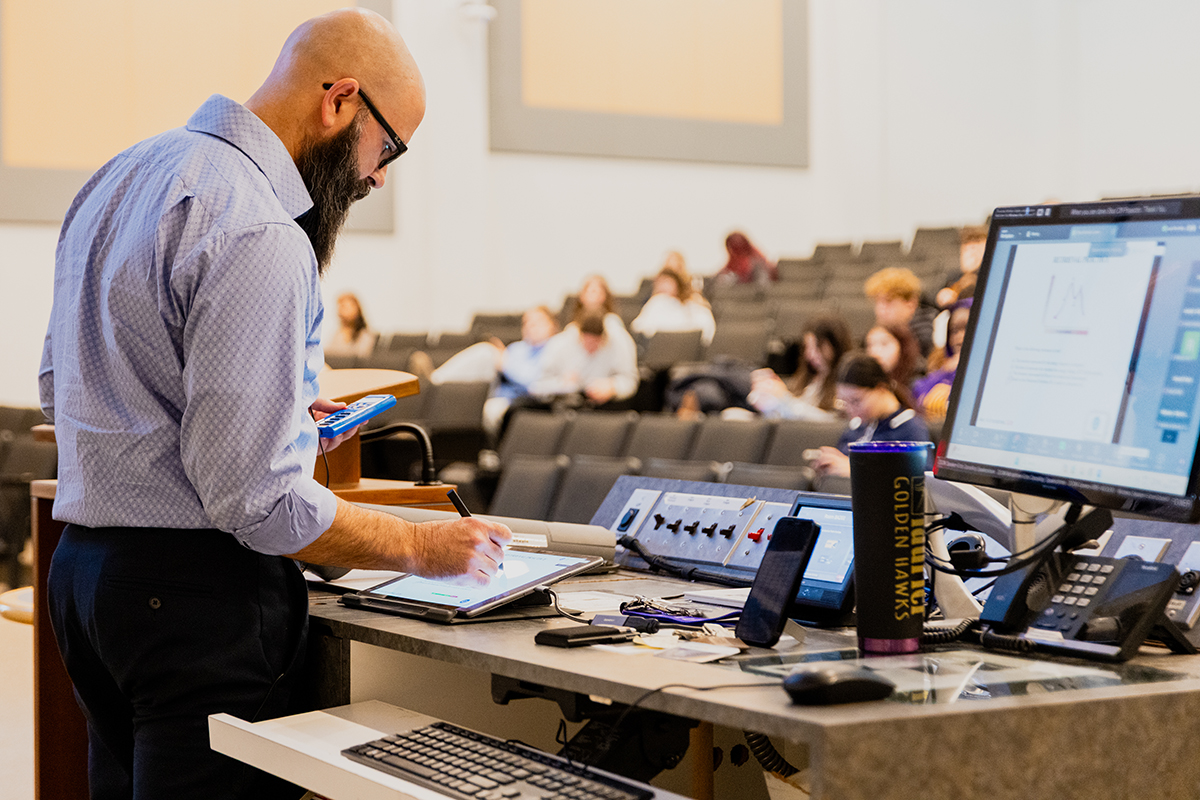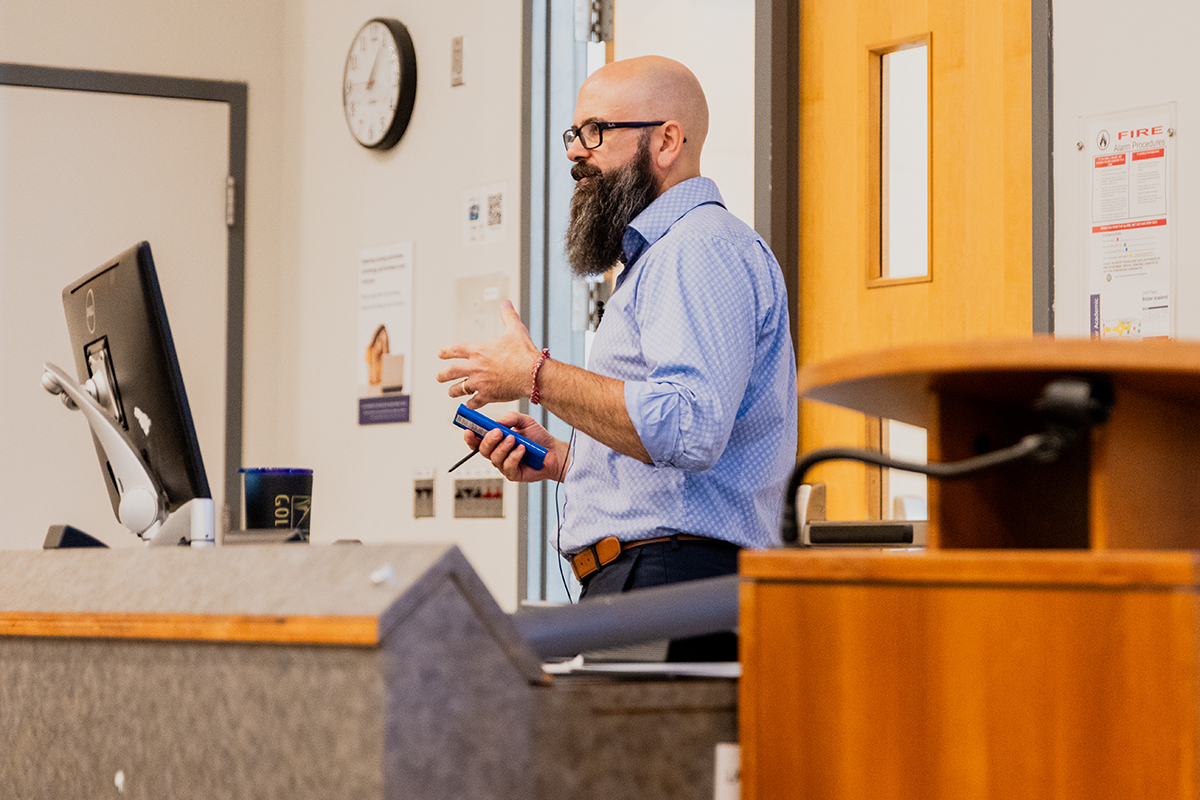We use cookies on this site to enhance your experience.
By selecting “Accept” and continuing to use this website, you consent to the use of cookies.
Search for academic programs, residence, tours and events and more.
Nov. 7, 2025
Print | PDFWhen students walk into Professor Steve MacNeil’s organic chemistry classroom at Wilfrid Laurier University, many are bracing for one of the most feared courses in science. What they find instead is a teacher who turns anxiety into confidence, confusion into clarity, and content into connection.
This year, MacNeil’s dedication to student-centred, evidence-based teaching earned him one of Canada’s highest honours: the 2025 3M National Teaching Fellowship.
Widely regarded as the country’s most prestigious award for post-secondary educators, the fellowship recognizes excellence in teaching, pedagogical innovation and educational leadership. For MacNeil, it’s a moment of reflection – not just on his career, but on the evolution of his teaching philosophy.
“When I first started at Laurier, I thought my main job in the classroom was to teach organic chemistry,” says MacNeil. “That has completely transformed over 20-plus years. More importantly, I need to teach students how to learn.”
MacNeil’s journey began with a single course at the University College of Cape Breton in 1991 – David Sneddon’s “Introduction to Organic Chemistry” – which sparked a lifelong passion. After earning a Bachelor of Science in Chemistry at Acadia University in 1994, a Master’s in Organic Chemistry at the University of Waterloo in 1997 and a PhD in Organic Chemistry at Queen’s University in 2001, he joined Laurier in 2003. It wasn’t long before MacNeil began asking deeper questions: Why is organic chemistry so difficult for students? And how can it be better?

3M National Teaching Fellowship recipient Professor Steve MacNeil teaches a class at Wilfrid Laurier University’s Waterloo campus.
The answers led him to metacognition – the science of learning how we learn.
“Students often think they’re learning when they’re just memorizing,” says MacNeil. “And there’s a gap between what students think they can do and what they can actually do because they tend to mistake familiarity for mastery. If we utilize resources and activities that help them try to close that gap, that’s going to lead to improved learning and performance.”
MacNeil’s teaching has evolved from flipped classrooms – where students engage with material before class and use class time for active learning – to a full metacognition co-curriculum developed in collaboration with Laurier Psychology Professor Eileen Wood, herself a 3M National Teaching Fellowship recipient in 2016. The metacognition co-curriculum includes learning task inventories and other reflection exercises, tools that provide students a path to academic success.
“We saw that there was a real effect by students simply doing that learning task inventory,” says MacNeil. “The more of those students did across the term, the better their final exam grade was. We had direct evidence that having students engage in these repeated metacognitive activities led to better performance on the final exam and the course.”
MacNeil has also embraced “desirable difficulties,” learning challenges that require extra effort but lead to better long-term retention and understanding. Examples of desirable difficulties include techniques such as delayed retrieval practice and “brain dumps” after completing course readings.
“Learning is supposed to be difficult. If you’re finding something easy, you’re probably not learning,” says MacNeil, who creates course assessments that provide students with frequent low-stakes and sometimes “no-stakes” opportunities to struggle with the material, make mistakes and learn from them.

MacNeil strives to change students’ perceptions about organic chemistry and learning in general using strategies based in metacognition.
“Generating a wrong answer is more effective for long-term retention than somebody giving you the right answer, if that wrong answer is followed up with quick feedback,” he says. “The whole point is to try to keep the focus on learning, to help students understand that they need to struggle with the material. They need to make those mistakes because it’s an essential part of learning.”
At the core of MacNeil’s approach to teaching is a belief in relationships and research. Before each term begins, he releases a student survey to learn as much as he can about his class in advance and integrates metacognitive learning strategies directly into coursework.
“Students need to know I care about them,” he says. “And they need to know that what I’m asking them to do is grounded in educational literature – not just whims. I tell them why I’m taking the approach I do and provide the literature that supports it.”
It’s an approach that has clearly resonated with MacNeil’s students, including Emily Rodriguez, who went on to complete a PhD in Biochemistry and Molecular Biology following her time in MacNeil’s classroom. Rodriguez currently serves as an instructor and postdoctoral researcher at Laurier.
“What truly sets Dr. MacNeil apart is his ability to cultivate a sense of community within the classroom,” says Rodriguez. “His student-centred approach made me feel valued and supported and his innovative methods made learning an interactive and engaging process.”
MacNeil’s original investigation into the flipped classroom model was inspired more than 15 years ago by a suggestion from Laurier President and Vice-Chancellor Deborah MacLatchy, then serving as provost and vice-president: academic. In an email to MacNeil, MacLatchy said she hoped Laurier would explore the flipped classroom model. He took up the task, which soon became a path to deeper pedagogical exploration and his collaboration with Wood.
“In hindsight, everything I was doing in the flipped classroom format was really about metacognition – getting students to struggle with some of the material on their own before coming to class and engage with more difficult concepts through active learning techniques in class,” says MacNeil. “Wrestling with the material instead of passively receiving it prompted students to think about their thinking and facilitated more accurate self-assessments.”

MacNeil has embraced “desirable difficulties,” learning challenges that require extra effort from students but lead to better long-term retention.
MacNeil’s influence extends far beyond his own lectures. He co-founded Laurier’s Chemistry Education Committee and SCAFFOLD, a multidisciplinary community of practice focused on blended learning. He’s also contributed to the assessment of Canadian chemistry programs through the Canadian Society for Chemistry (CSC) and recently spearheaded extensive changes to the CSC’s national accreditation guidelines.
Colleagues describe MacNeil as a mentor, coach and cheerleader. During his tenure as chair of Laurier’s Department of Chemistry and Biochemistry – spanning the entirety of the COVID-19 pandemic – MacNeil remained a steady and supportive presence.
“Steve’s drive, passion and innovative teaching methods serve as an inspiration to his students and colleagues alike,” says Louise Dawe, an associate professor in the Faculty of Science. “His commitment to high-impact teaching practices and his leadership within our department have profoundly influenced the teaching culture at our institution.”
MacNeil was nominated for his 3M National Teaching Fellowship by Richelle Monaghan, professor and vice-dean in Laurier’s Faculty of Science who was named a 3M National Teaching Fellow in 2024. Monaghan notes that MacNeil’s innovative and transformational teaching practices have reshaped chemistry education across the sector through a blend of scientific rigour and heartfelt generosity.
“Steve has not only strengthened educational practices within Laurier but has also set a new standard for chemistry education nationally,” says Monaghan. “By fostering spaces where mistakes are valued as growth opportunities, Steve invites his students and colleagues to experience the transformative power of second chances.”
MacNeil’s leadership style is grounded in gratitude and shaped by personal experience. Raised by a single mother who he says always put family first, he also credits the generosity of mentors and teachers for his success.
“The generosity I experienced growing up and early in my chemistry career molded me into a person who is always counting their blessings, always optimistic, seeing possibilities and potential where others might see problems,” says MacNeil. “Nothing feels like a problem to me. Everything feels like an opportunity for change and growth.”
“Steve has not only strengthened educational practices within Laurier but has also set a new standard for chemistry education nationally.”
– Professor Richelle Monaghan
MacNeil’s efforts have been recognized with previous teaching awards, including the Laurier Teaching Excellence Award in 2011; the OCUFA Excellence in Teaching Award in 2012; a Laurier Teaching Fellowship in 2013; and the D2L Innovation Award in 2018. His 2025 3M National Teaching Fellowship affirms the impact of his teaching on students and the broader educational community.
“The fellowship is a nice recognition of the time and effort I’ve put into teaching,” says MacNeil. “And it connects me with a network of educators who are as passionate about teaching and student learning as I am. It inspires me to continue to try to change students’ perceptions about organic chemistry and about learning in general.
“When they say, ‘I heard such terrible things about this course, but now I think I’ll take more organic chemistry’ or ‘I’ve learned things in your course that I can use in future courses,’ that confirms that all of my efforts are worth it.”